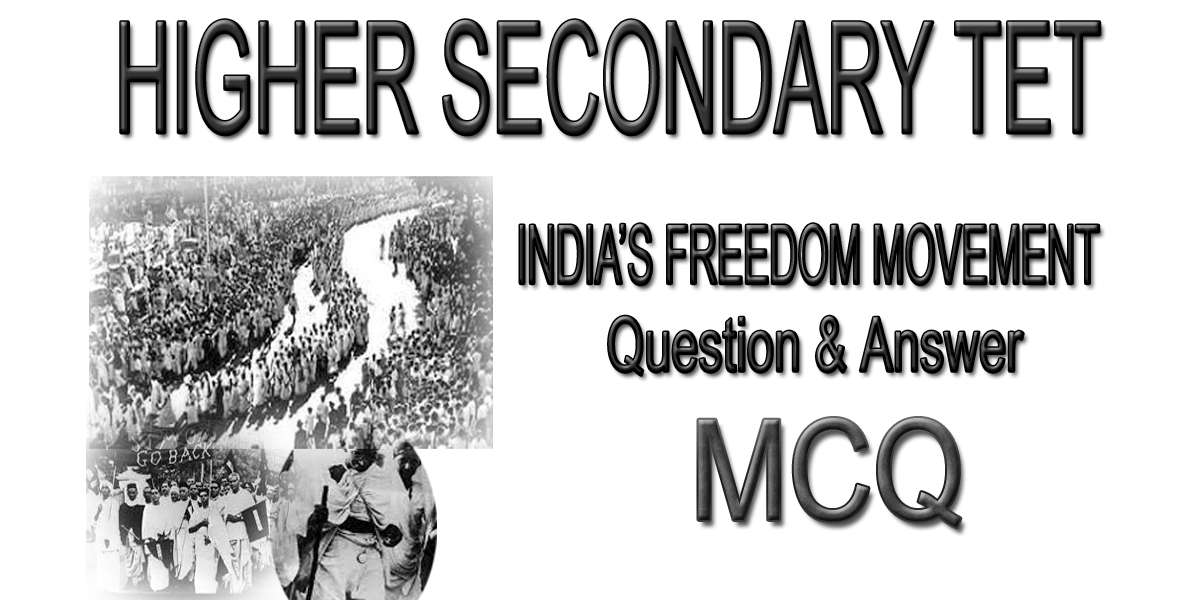Higher Secondary TET Notes 2020. The national movement and constitutional development culminated in the enactment of the Indian Independence Act 1947. This Act brought British rule to an end and established two dominions of India and Pakistan with right to secede from the British Commonwealth. The enactment of the Indian Independence in Act 1947 was an event of great constitutional importance in so far as it closed the chapter of British rule in India and ushered the dawn of free India.
Higher Secondary TET Notes 2020
Select the correct Answer
1. The Pitt’s India Act:
(a) increased the strength of the Governor-General’s Council from four to five
(b) reduced the strength of Governor- General Council from five to four
(c) reduced the strength of Governor General’s Council from four to three
(d) did not make any change in the strength of the Governor-General’s Council
Ans: c
2. Which one of the following statements is correct?
(a) Pitt’s India Act made no changes in the Home Government of the Company
(b) Pitt’s India Act envisaged the appointment of six Commissioners for the Affairs of India
(c) Pitt’s India Act provided for appointment of Ten Commissioners for the Affairs of India
(d) None of the above
Ans: b
3. Under the Pitt’s India Act:
(a) no change was effected in the position of the Governor-General
(b) the position of the Governor-General vis-a-vis his Council was made weak
(c) the position of the Governor-General at vis a vis his Council was made strong
(d) none of the above
Ans: c
4. The Pitt’s India Act:
(a) deprived the Governor-General as well as Governors of the right to vote in the Council
(b) gave the Governor-General the right to vote but gave no corresponding right to the Governors
(c) gave casting vote to the Governor- General but not to the Governors
(d) gave casting vote to the Governor General as well as the Governors
Ans: d
5. Which one of the following statements with regard to the Charter Act of 1793 is not correct?
(a) it extended the privileges of the Company for a further period of twenty years
(b) it provided for the payment of salaries and other expenses of the members and staff of the Board of Control out of Indian revenues
(c) it reasserted the predominant position of the Governor-General over the Presidencies of Bombay and Madras
(d) it permitted the servants of the Company to accept gifts and presents
Ans: d
6. The Act of 1793 declared that:
(a) the policy of conquest and extension was repugnant to the wish, honour and policy of the nation
(b) the policy of conquest and extension of dominion should be vigorously pursued in India
(c) the Company should pursue policy of extension of dominions with the prior approval of home authorities
(d) contained no reference regarding policy of conquest and extension
আপুনি যদি আমাৰ পেজ পঢ়ি ভাল পাইছে তেন্তে আমাৰ ‘নিউজলেটাৰ চাবস্ক্রাইব’ কৰক। নতুবা আমাৰ ‘ফেচবুক পৃষ্ঠা’ অনুসৰণ কৰক বা আমাৰ “ইউটিউব চেনেল চাবস্ক্রাইব’ কৰক ।
Ans: a
7. Which one of the following Charter Act deprived the Company of monopoly of trade with India except for tea?
(a) the Charter Act of 1793
(b) the Charter Act of 1813
(c )the Charter Act of 1833
(d) the Charter Act of 1853
Ans: b
8. The general Indian trade was thrown open to the Brifish subjects by the Charter Act of
(a) 1793
(b) 1813
(c) 1853
(d) none of the above
Ans: b
9. The British missionaries were permitted to go and settle in India under:
(a) Regulating Act of 1773
(b) Pitt’s India Act of 1784
(c) Charter Act of 1793
(d) Charter Act of 1813
Ans: d
10. An amount of Rs. 1,00,000 for the promotion of knowledge of sciences amongst the inhabitants of British of territories in India was for the first time ear-marked under:
(a) Charter Act 1813
(b) Charter Act 1793
(c) Charter Act 1853
(d)None of the above
Ans: a
